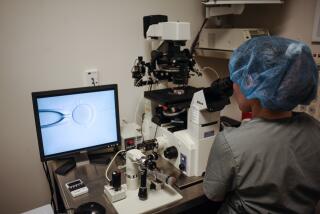An Exception to the Rule : Parents should be able to donate organs of infants born without brains
- Share via
Under the laws of every state, and under prevailing medical ethics, human organs cannot be removed for transplant until the donor is legally dead. There is good rationale for this: to prevent abuses. But every rule needs an exception, and one is warranted in the tragic cases of anencephalic newborns.
Anencephaly is a congenital birth defect in which the infant is born without a forebrain and cerebrum, but is able to survive for a short time with a brain stem that permits breathing, sucking and other autonomic functions. Without higher brain functions, they can never experience consciousness, thoughts, emotions, pain or anything remotely resembling human being. Few survive more than a few days. Yet their organs cannot be used to fill the desperate need for transplants by other infants because the organs deteriorate badly if doctors must wait for natural death to occur.
Now the Council on Ethical and Judicial Affairs of the American Medical Assn. has proposed to allow removal of organs before death--as long as the parents agree and two doctors concur in the diagnosis of anencephaly. Nearly half of all children under age 2 waiting for hearts, livers and kidneys die before a suitable organ is found. While not all of the 1,000 to 2,000 anencephalics born yearly in this country are suitable donors, many of them could save young lives.
Doubters worry that this could send us down a slippery ethical and legal slope in which infants with other neurological impairments and elderly people with dementia would be sacrificed for their organs. But medical ethics and the law constantly change to reflect new understanding of human physiology. Two decades ago the law caught up with medical science and recognized that life ends when the brain ceases to function, even if breathing and other functions continue.
Anencephaly is a wrenching tragedy for parents. Many, perhaps most, yearn at least for the moral satisfaction of saying they have saved the lives of other ill infants--if only the law permitted organ donation. It is time for the Legislature of California and other states to amend the Uniform Anatomical Gift Act to allow this exception.






